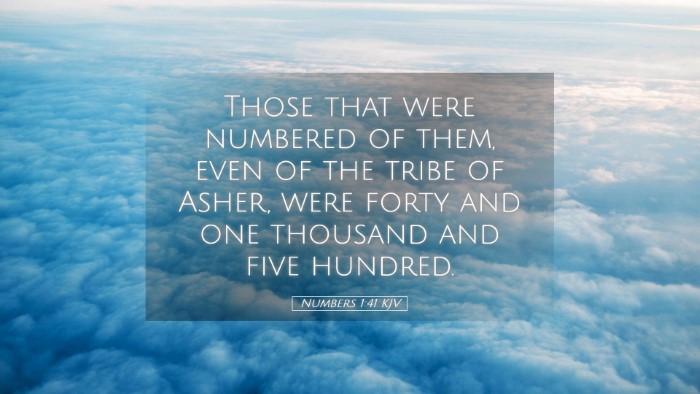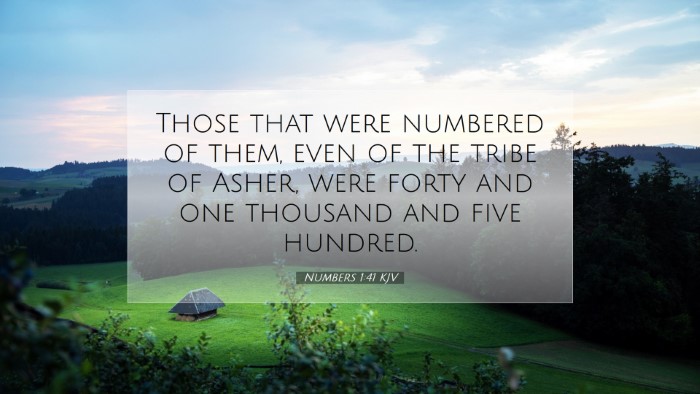Commentary on Numbers 1:41
Numbers 1:41 states, "Those that were numbered of the tribe of the sons of Asher were forty and one thousand five hundred." This verse records the census taken of the Israelites as they prepared to enter the Promised Land. The enumeration of the tribes serves not only to account for the people but also to highlight the Lord's faithfulness in fulfilling His promises to the descendants of Abraham, Isaac, and Jacob.
Understanding the Context
The Book of Numbers, also known as the Book of the Wilderness, details the experiences of the Israelites as they journey through the desert towards Canaan. In the opening chapters, God commands Moses to take a census of Israelite tribes, which is a preparation for their organization in camp and military structure.
Matthew Henry notes the importance of this census, stating that it was a means of determining the readiness of Israel for conquest and to ensure they were prepared to enter the land God had promised. The tribe of Asher, in this context, represents the rich diversity and strength of the Israelites as a whole.
The Tribe of Asher
Asher, whose name means "happy" or "blessed", was one of the sons of Jacob and Leah's maid Bilhah, making the tribe significant among the other tribes. Each tribe had its unique characteristics and strengths, collectively contributing to the identity of the nation of Israel.
-
Population Insights: Albert Barnes emphasizes that Asher's population of 41,500 indicates a substantial number, suggesting growth and vitality within the tribe post-Egyptian bondage.
-
Cultural Contribution: Adam Clarke posits that Asher's descendants were known for their productivity and prosperity, particularly in agriculture and trade. This indicates that they were poised to thrive in the fertile lands of Canaan.
Spiritual Significance
The counting of the Israelites serves an important reminder of God's providence in their lives. It symbolizes the fulfillment of God's promise to multiply Abraham’s descendants, heralding a people chosen for His purpose.
Matthew Henry points out that every individual numbered in the census held a distinct value in God's sight. This serves to reaffirm the intimate connection between God and His people and emphasizes the importance of each member within the larger community of believers.
Moreover, in a pastoral context, this passage underlines the necessity of recognizing and valuing the contributions of each member in a congregation. Just like the Israelites, every believer possesses unique gifts that contribute to the Church's mission.
The Role of Organization
The systematic approach to census-taking demonstrates divine order and authority. God's instruction to number the tribes heralds a time of preparation. Albert Barnes indicates that being organized in their approach to entering the Promised Land ensures that they operate effectively as an army prepared for battle.
Adam Clarke elaborates by stating that organization allowed the Israelites to display unity, discipline, and strategic capability, attributes that are essential for any community aspiring to fulfill a divine calling.
Lessons for Today
This brief yet powerful verse invites pastors and theologians to reflect on themes of identity, belonging, and divine purpose:
-
Recognition of Individual Worth: Just as every Israelite counted in the eyes of God, each individual today contributes to the body of Christ (1 Corinthians 12:12-27).
-
Importance of Preparation: The organization and structure seen in the census remind believers of the importance of preparedness in fulfilling God's mission.
-
Blessings of Community: The diversity and strength of the tribes show the beauty and strength found in community, echoing the unity that believers are called to embody in the Church today.
Conclusion
In conclusion, Numbers 1:41 stands as a significant testament to God’s faithfulness and a call to recognize the individual and collective identity of believers. By studying this scripture through the insights of esteemed commentators, we grasp not only the logistics of the Israelite journey but also the spiritual richness inherent in their story. This verse encapsulates key lessons about God’s providential care, the importance of community, and the readiness to engage in the work God has set before us.


